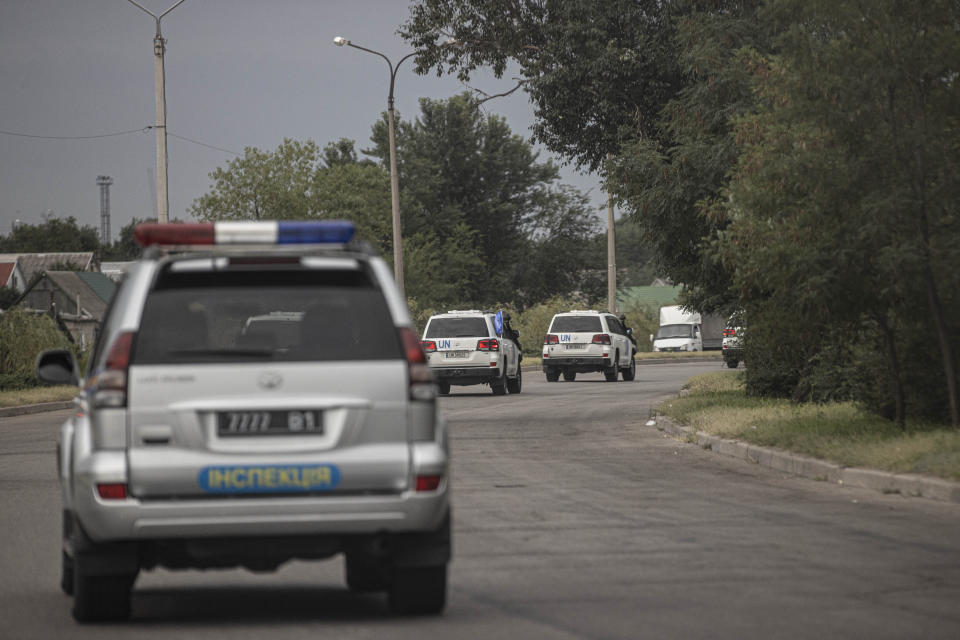Ukraine nuclear plant inspectors arrive despite fighting
A team of international inspectors arrived at Europe’s largest nuclear power plant Thursday despite renewed shelling that underscored fears of a radiation disaster.
Ukraine and Russia traded fresh accusations that the other side was endangering the United Nations team, as well as the Zaporizhzhia plant’s nuclear reactors, to disrupt the risky mission to secure the plant's safety. But the experts from the International Atomic Energy Agency, or IAEA, pressed on despite the fighting.
Kyiv accused Moscow's forces early Thursday of shelling the occupied nuclear power plant — and the route the IAEA inspectors were taking.
Russian officials blamed Kyiv for the fierce fighting around the site. Its Defense Ministry said Ukrainian troops had tried a daring amphibious landing to seize back control of the plant.
NBC News could not immediately verify either side’s claims.
IAEA Director General Rafael Grossi told reporters that he had been able to tour the whole site.
“I went into the units. I could visit the emergency systems, the diesel generators, the different parts. So we have the control rooms of some of the nuclear power plants there, so we chose three or four key areas we needed to see firsthand, and I was able to do that,” he said.
He said he had spoken “to the staff a lot and the people of Enerhodar, the people from the village who came to meet with me and to see me and to get the support that they deserve from the IAEA.”
Grossi said the IAEA would establish a “continued presence” of experts at the plant “so they can provide me and all of us with an impartial, neutral, technical, sound assessment of whatever may be happening there.”
He added that he would “continue to worry about the plant until we have a situation that is more stable” and that it was “obvious” that the integrity of the plant has been “violated.”
Earlier, the nuclear agency said the mission was delayed on the Ukrainian-controlled side for about three hours.
Grossi told Reuters the inspectors would spend “several days” at the plant before it reports back to an increasingly alarmed international community.

Shelling of the plant itself triggered its safety systems and forced the shutdown of one of its reactors while damaging the power supply lines, officials from both sides said early Thursday.
Ukraine's state nuclear agency blamed Russian forces for the shelling; a Russian-installed local official said Ukrainian forces were responsible. Last week, the plant was disconnected from Ukraine’s national power grid for the first time in its 40-year history.
Moscow’s troops were also firing at the route the inspectors were taking as they set out from the city of Zaporizhzhia — which is under Ukraine’s control — to the nearby plant, which Russian forces have controlled since the early days of the war, Oleksandr Starukh, the Ukrainian regional governor, said in a Telegram post.
Both sides also blamed the other for shelling the nearby town of Enerhodar.
“They want to disrupt the visit of the IAEA mission. These are the actions of a terrorist state, which is afraid that the world will learn the truth," Andriy Yermak, the head of President Volodymyr Zelenskyy’s office, said in a Telegram post.
The Kremlin’s intention was “to blame it on Ukraine,” Zelenskyy’s adviser, Mykhailo Podolyak, also said in a tweet.
But Russia's Defense Ministry accused Kyiv of trying to disrupt the IAEA visit. The situation in the area of the Zaporizhzhia plant "is complex," the ministry said, but remains under "complete control."
It said earlier that Ukrainian forces had launched a remarkable mission to regain control.
The ministry said a Ukrainian “sabotage group” of up to 60 soldiers crossed the Dnieper River separating the two sides and landed on the coast within 2 miles of the plant. It said measures were taken to destroy the group, including using military helicopters.
In the part of Zaporizhzhia closest to the nuclear plant, NBC News saw women and children lined up in a hospital near the Dnieper River on Thursday, waiting to get potassium iodine tablets.
A sign posted on the wall instructed residents to take the tablets within six hours of the arrival of a “radioactive cloud.”
Svitlana Groha said health officials doling out the pills instructed her not to take them unless the government issues an official notification of a radiation accident.
Groha, 21, said she feels a “sense of danger about what might happen,” particularly if she has to give iodine to her 7-month-old daughter, Ksenia.
“I don’t know how it can affect my child, what the consequences may be for her,” she said.
The head of the International Committee of the Red Cross, Robert Mardini, warned Thursday that little could be done to respond to a major accident at the plant.
“In the event of a nuclear leak, it will be difficult, if not impossible, to provide humanitarian assistance," Mardini said at a news conference during a visit to Ukraine, Reuters reported. "This is why fighting should stop.”
This article was originally published on NBCNews.com

